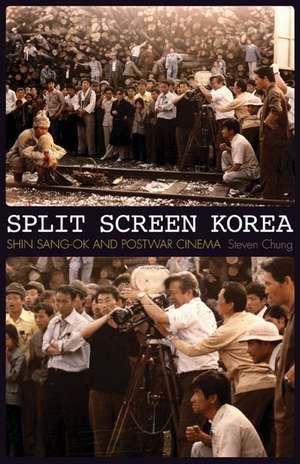Split Screen Korea: Shin Sang-ok and Postwar Cinema
Autor Steven Chungen Limba Engleză Paperback – 14 mar 2014
Shin Sang-ok (1926–2006) was arguably the most important Korean filmmaker of the postwar era. Over seven decades, he directed or produced nearly 200 films, including A Flower in Hell (1958) and Pulgasari (1985), and his career took him from late-colonial Korea to postwar South and North Korea to Hollywood. Notoriously crossing over to the North in 1978, Shin made a series of popular films under Kim Jong-il before seeking asylum in 1986 and resuming his career in South Korea and Hollywood.
In Split Screen Korea, Steven Chung illuminates the story of postwar Korean film and popular culture through the first in-depth account in English of Shin’s remarkable career. Shin’s films were shaped by national division and Cold War politics, but Split Screen Korea finds surprising aesthetic and political continuities across not only distinct phases in modern South Korean history but also between South and North Korea. These are unveiled most dramatically in analysis of the films Shin made on opposite sides of the DMZ. Chung explains how a filmmaking sensibility rooted in the South Korean market and the global style of Hollywood could have been viable in the North.
Combining close readings of a broad range of films with research on the industrial and political conditions of Korean film production, Split Screen Korea shows how cinematic styles, popular culture, and intellectual discourse bridged the divisions of postwar Korea, raising new questions about the implications of political partition.
Preț: 124.03 lei
Preț vechi: 170.02 lei
-27% Nou
Puncte Express: 186
Preț estimativ în valută:
23.73€ • 25.38$ • 19.79£
23.73€ • 25.38$ • 19.79£
Carte indisponibilă temporar
Doresc să fiu notificat când acest titlu va fi disponibil:
Se trimite...
Preluare comenzi: 021 569.72.76
Specificații
ISBN-13: 9780816691340
ISBN-10: 0816691347
Pagini: 304
Ilustrații: 18
Dimensiuni: 140 x 216 x 18 mm
Greutate: 0.31 kg
Ediția:1
Editura: University of Minnesota Press
Colecția Univ Of Minnesota Press
ISBN-10: 0816691347
Pagini: 304
Ilustrații: 18
Dimensiuni: 140 x 216 x 18 mm
Greutate: 0.31 kg
Ediția:1
Editura: University of Minnesota Press
Colecția Univ Of Minnesota Press
Notă biografică
Steven Chung is assistant professor of East Asian studies at Princeton University.
Cuprins
Contents
Introduction: Visible Ruptures, Invisible Borders
1. The Century’s Illuminations: The Enlightenment Mode in Korean Cinema2. Regimes within Regimes: Film and Fashion in the Korean 1950s3. Authorship and the Location of Cinema: In the Region of Shin Films4. Melodrama and the Scene of Development5. “It’s All Fake”: Shin Sang-ok’s North Korean RevisionsConclusion: Post-Development Pictures
AcknowledgmentsNotesShin Sang-ok FilmographyBibliographyIndex
Introduction: Visible Ruptures, Invisible Borders
1. The Century’s Illuminations: The Enlightenment Mode in Korean Cinema2. Regimes within Regimes: Film and Fashion in the Korean 1950s3. Authorship and the Location of Cinema: In the Region of Shin Films4. Melodrama and the Scene of Development5. “It’s All Fake”: Shin Sang-ok’s North Korean RevisionsConclusion: Post-Development Pictures
AcknowledgmentsNotesShin Sang-ok FilmographyBibliographyIndex
Recenzii
"Lucidly and sensitively written, Steven Chung’s book is not only a historical study of a single director and national culture caught in an eventful time period. It is also an excellent thesis on cinema as a locus of multidiscursivity whose evolving fissures—temporal, spatial, technical, and experiential—defy any facile attempt to stabilize meanings by way of aesthetics or geopolitics."—Rey Chow, Duke University
"Split Screen Korea is a pathbreaking work that offers a theoretically sophisticated study of the complex and shifting relations between Korean cinema and mass culture. Through its careful, meticulous tracing of Sin Sang-ok’s work as a director, producer, and studio head, this book allows us to rethink the multilayered cultural and visual politics of divided Korea and, more broadly, the global Cold War itself."—Theodore Hughes, Columbia University
"Split Screen Korea is a pathbreaking work that offers a theoretically sophisticated study of the complex and shifting relations between Korean cinema and mass culture. Through its careful, meticulous tracing of Sin Sang-ok’s work as a director, producer, and studio head, this book allows us to rethink the multilayered cultural and visual politics of divided Korea and, more broadly, the global Cold War itself."—Theodore Hughes, Columbia University
"Split Screen Korea exemplifies a kind of necessary scholarly monograph that will never go out of style. Instead of seeking to construct yet another fashionable revisionist history, Steven Chung writes fluidly and directly, establishing ‘film and nation’ as the basic binary from which his research emanates."—Slant Magazine
"Written in clear, jargon-free prose and gently persuasive and accommodating in its engagement with the existing scholarship, Steven Chung’s Split Screen Korea mounts a compelling case for re-examination and re-evaluation of the commercial Korean films produced between 1953 and 1979."—Pacific Affairs
"Chung presents his arguments beautifully in jargon-free, concise language and offers a pleasurable sense of discovery at every turn. . . Split Screen Korea: Shin Sang-Ok and Postwar Cinema is a formidable work and a crucial contribution to the field of Korean studies, film studies, and mass media studies."—Situations
"Written in clear, jargon-free prose and gently persuasive and accommodating in its engagement with the existing scholarship, Steven Chung’s Split Screen Korea mounts a compelling case for re-examination and re-evaluation of the commercial Korean films produced between 1953 and 1979."—Pacific Affairs
"Chung presents his arguments beautifully in jargon-free, concise language and offers a pleasurable sense of discovery at every turn. . . Split Screen Korea: Shin Sang-Ok and Postwar Cinema is a formidable work and a crucial contribution to the field of Korean studies, film studies, and mass media studies."—Situations
Descriere
In Split Screen Korea, Steven Chung illuminates the story of postwar Korean film and popular culture through the first in-depth account in English of Shin Sang-ok’s remarkable filmmaking career. Split Screen Korea shows how cinematic styles, popular culture, and intellectual discourse bridged the divisions of postwar Korea, raising new questions about the implications of political partition.
